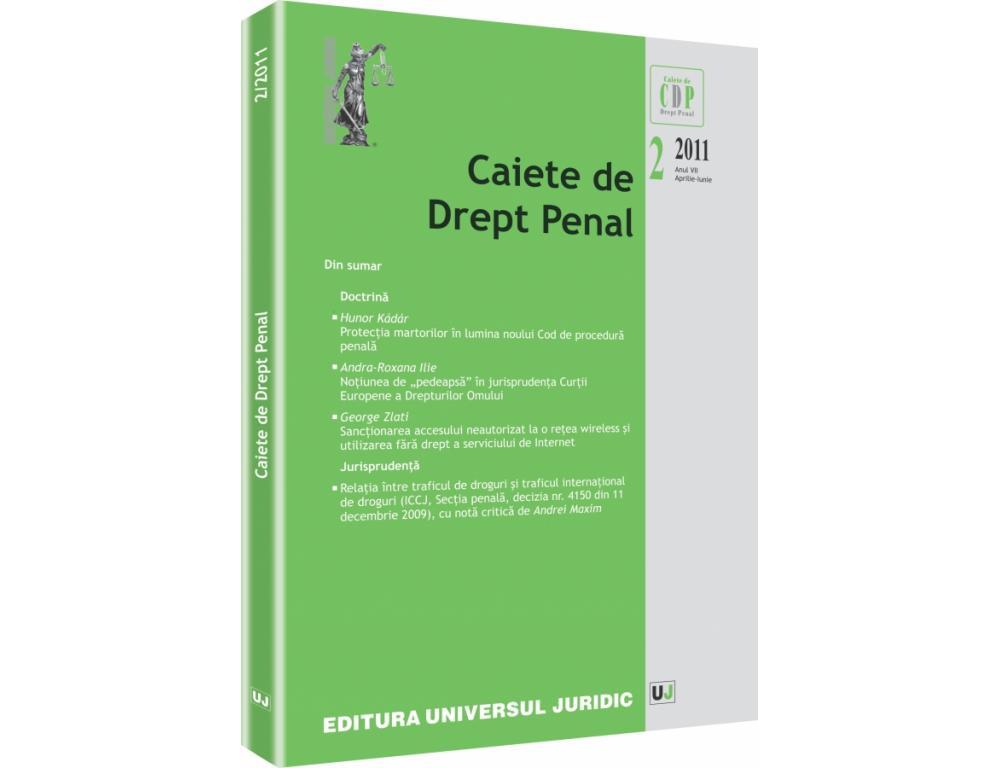Actele de terorism în legislatia penala romana
Acts of Terrorism in the Romanian Criminal Law
Author(s): Iulian Alexander StoiaSubject(s): Law, Constitution, Jurisprudence, Civil Law
Published by: Universul Juridic
Keywords: terrorism; Framework Decision 2002/475/JHA; combating terrorism;
Summary/Abstract: In order to fulfil the requirements imposed by the admission in European Union, Romania has undertaken the task of enforcing the European acquis in the national law. Among the E.U. regulations that needed to be implemented could be found the Council Framework Decision 2002/475/JHA on combating terrorism, adopted in the Third Pillar of the Union (Justice and Home Affairs), which was transposed by the Law numbered 535/2004 on preventing and combating terrorism. Although this legal instrument was claimed to be an effective mean of countering and punishing the acts included in the mentioned phenomenon, there have been enforced certain criminal law provisions (previously existing in the Romanian legislation) which raise some serious issues when clarity, coherence and applicability is questioned. Comparing the Framework Decision with the national law, we note that this time the Romanian legislator did not resort on its constant practice when transplantation of European regulation is concerned, consisting of a mechanical translation of texts, but it even attempted to improve the shortfalls and optimize the provisions of the Framework Decision which needed to be complied with. In our opinion, the opportunity or the necessity of such an option cannot be understood, at least for the reasons which will be presented in the study. In substance, the crimes classified as acts of terrorism represent distinctly punishable felonies under the Criminal Code or other laws containing criminal provisions, but they were embedded in this newly created concept due to the special aim which determines the perpetrator to commit the deed. Therefore, the application of the texts causes issues, as the special terrorist aim, in the terms it is defined by the legislator within the 2nd article of the Law numbered 535/2004, is unreasonably limited to those situations in which it is pursued „the accomplishment of specific objectives, of a political nature, by determining the authorities of a state or of an international organization to order, to abandon or to influence a decision, in favour of a terrorist entity”. Furthermore, the articles 32 and 34 of the Law numbered 535/2004 can be criticized on the ground of the lack of compliance with the requirement lex certa imposed by the basic criminal law principle nullum crimen sine lege. Thus, the concept of terrorism reunites intentional conducts against life, injuries to body or health, deprivation of physical liberty, property damage, breach of the legal regime of weapons and ammunition, breach of the legal regime of nuclear and other radioactive materials, breach of the legal regime of explosives and chemical or biological weapons, but also felonies against the safety of air and sea navigation. Also, constitutes a terrorist act the alert about committing some of the deeds described above. In this context, there have been analyzed some of the issues of mismatch raised by the provisions of the Law on preventing and combating terrorism in the relation between them, or in relation to other criminal rules which are in force. The 33rd article of the Law numbered 535/2004 punishes a series of conducts which are not considered acts of terrorism, but which are assimilated to these. At the most superficial analysis it is identifiable a paradox whose reason lies beyond our power of comprehending: all these deeds do not represent anything else but acts of preparation for committing the terrorist crimes provided by the articles 32 and 34 of the Law on preventing and combating terrorism, distinctly criminalized, while under the 5th paragraph of article 32 and the 4th paragraph of article 34 preparatory acts are treated as punishable attempt. Considering the reasons mentioned, developed and argued throughout the study, we can only disavow the incoherent legal system built up by the criminal rules laid down by the Law numbered 535/2004. The Criminal Code and the other laws containing criminal provisions provide texts of indictments in a sufficient manner, with suitable penalties, under which conducts as dangerous as the terrorist crimes could be punished, being not necessary to create a new legal instrument, almost inapplicable due to its grounding on concepts foreign to the Romanian criminal law.
Journal: Caiete de drept penal
- Issue Year: 2011
- Issue No: 02
- Page Range: 11-29
- Page Count: 19
- Language: Romanian
- Content File-PDF

